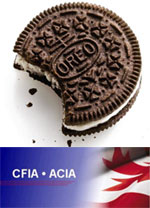This is an archive of news stories and research from the National Union of Public and General Employees. Please see our new site - https://nupge.ca - for the most current information.
Canadian Food Inspection Agency audit uncovers flaws in systems it supervises to ensure food safety.
 Ottawa (30 Sept. 2010) - An internal audit of safety systems for food imported into Canada has found deficiencies that heighten the risk of contaminated products getting into the food supply.
Ottawa (30 Sept. 2010) - An internal audit of safety systems for food imported into Canada has found deficiencies that heighten the risk of contaminated products getting into the food supply.
The Canadian Food Inspection Agency (CFIA) says an audit carried out in July was intended to "provide assurance to senior management" that the agency activities related to imported foods are "designed, organized and delivered" in keeping with federal food-safety objectives. Instead, it has uncovered a different picture.
"In my opinion, CFIA management of imported-food safety has deficiencies that represent multiple areas of risk exposure requiring significant improvements related to the governance, control and risk-management processes," writes Peter Everson, CFIA's chief audit executive.
Incredibly, one of the main findings raises the question about whether CFIA will act on the problems. Along with an absence of regular reporting to management on the performance of the agency's nine food-commodity programs, the audit found that procedures are not in place to ensure that problems flagged in prior audits and internal reviews are addressed.
CFIA attempted in August, before the audit was released, to blunt criticism of the findings by launching an online consultation process to enhance import controls in the non-federally registered sector, which includes beverages, infant formula, confectionery, cereals, spices and seasonings and baked products.
The audit notes that these food products, in particular, are poorly tracked to determine whether they meet Canadian safety standards. It also says that no foreign country equivalence controls are in place for food-commodity programs other than meat, fish and eggs.
The audit assessed import controls for all nine food commodity programs: meat, fish, eggs, dairy, maple, honey, fresh fruits and vegetables, processed products and non-federally registered products.
Overall, the audit found that CFIA's Import Control Policy, announced in 2002 to guide import control activities, has not been fully implemented and an agency-wide strategy specific to imported food safety has not been developed.
The inflation-adjusted value of food imported has increased about 45% over a 10-year period – to $21.8 billion in 2006 from $14.2 billion in 1997. In 1993, 143 countries exported food products to Canada. The number today is about 200, representing over 70% of all food products sold in Canada.
NUPGE
The National Union of Public and General Employees (NUPGE) is one of Canada's largest labour organizations with over 340,000 members. Our mission is to improve the lives of working families and to build a stronger Canada by ensuring our common wealth is used for the common good. NUPGE
More information:
CFIA Audit of the Management of Imported Food Safety
